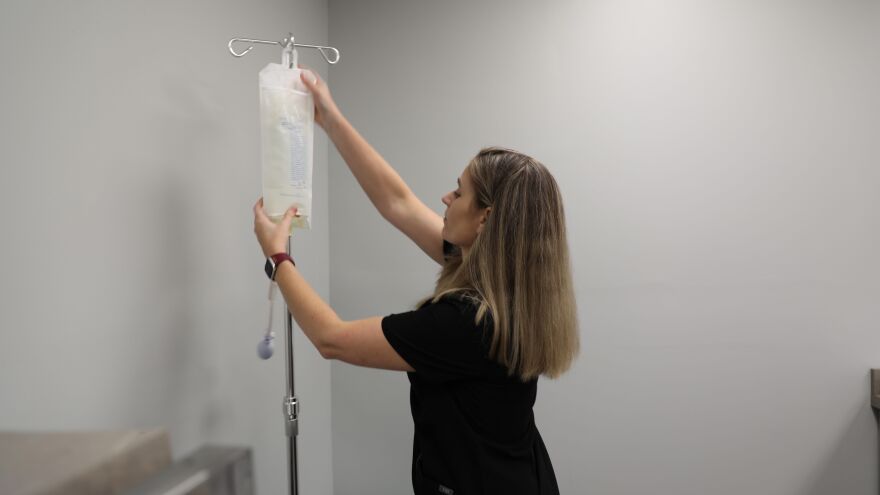When Ashley Powell first started practicing as a veterinarian, there were five emergency vets in Hampton Roads’ seven cities.
Now, ten years later, there’s only one.
“A lot of people in Hampton Roads that have needed emergency care have ended up having to go to Yorktown or Richmond or Williamsburg,” Powell said.
Powell and her business partner, Heather Brookshire, opened a new urgent care clinic for pets in Virginia Beach this month. Together they hope to address the need for quick appointments and alleviate the strain on local veterinary practices.
Powell owns one of those practices in addition to her new urgent care. Every day during their first hour of operation, the practice receives between 10 and 20 calls from pet owners.
“(They’re) people who need to get in that day, with things like limping or vomiting or skin infections,” Powell said. “And really, we're already operating on a full schedule. So it's like playing Tetris.”
During and after the worst of COVID, Brookshire said, people got pets. And those pets went to general practices to have their shots, get fixed and have routine appointments. Soon, there was a weeks-long waitlist for appointments at every practice.
“So then, a lot more urgent things were being seen ultimately by the emergency practices, and then that completely bogged down the emergency practices,” Brookshire said.
That’s where urgent care comes in.
Brookshire and Powell called their new practice Ally Urgent Care — an ally to the vet community.
BURNOUT AFFECTS VETS AND TECHS
Tara Golden runs the mobile veterinary clinic Golden Paws. She said people forget that it’s not just vets who have exhausting jobs.
“Technicians, assistants, receptionists — people don't realize that there's those different lines of defense. they're taking hits left and right. Angry clients, upset, scared clients with patients with all kinds of issues. Everybody's kind of feeling the heat.”
Golden’s technician, Madison Rankin, said mobile clinics often serve clients who can’t get themselves or their pets to the vet. That addresses a major need, but it doesn’t leave the techs and vets unscathed.
“The caseload can be really draining,” Rankin said. “I find that at the end of the day, I'm usually kind of peopled out.”
She said she feels as if it’s an effort to get ready to do it all again the next day.
A Merck analysis found higher levels of burnout among vets and vet techs than other professions.
According to a Mars Veterinary Health analysis, the U.S.’s demand for veterinary services increases by 6.1% every year. Vet supply in Hampton Roads isn’t keeping up.
Heather Andrews has a vet practice in Virginia Beach. She said staffing levels are still low after taking a hit during COVID.
“A lot of clients were really nasty during COVID, and a lot of staff said, ‘No, we're not dealing with this. We don't make enough money for this,’” she said.
The vets Andrews knows are constantly spread thin. One thing the public doesn’t often recognize, she said, is how many roles vets have to embody everyday.
“You go into one room and it can be an 18-year-old cat that’s owned by an 80-year-old woman. That's all that she has. And you have to explain that the cat has cancer,” she said.
Then you go to the next room. It's ‘Congratulations on your new puppy.’ Then you go into another room and it's ‘I'm sorry, but your animal is in kidney failure, has lung cancer,’” Andrews said.
“You're constantly running and your mind is constantly going.”
A 2018 CDC study put the veterinarian suicide rate at 3.5 times higher than the general U.S. population for female vets, and 2.1 times higher for male vets.
Andrews said the pandemic’s twin effects of closing practices and scattering support staff made vets’ jobs even more deadly. Vets contend with even more angry owners, impossible choices and punishing schedules.
COMPASSION FATIGUE
“We get into this profession because we care so much about the clients and the pets,” Powell at Ally Urgent care said. “I think over time that takes a really big emotional toll.”
Compassion fatigue is the biggest risk in a profession motivated by passion for animals. The American Veterinary Medical Association lists it as a long-term condition for vets who take on the pain and suffering their patients and clients experience day after day.
Eventually, said Andrews, it’s numbing.
“You put so much of your soul into these cases that it just exhausts you to the point where you don't have anything left in your soul to take care of yourself, to take care of your partners, your home, your own animals,” she said. “And it's a fatigue that sleep doesn't help.”
Another piece of the exhaustion puzzle is the debt vets take on for school.
“Most veterinarians are in their 40s still paying off that debt,” Golden said. “You don't see that with most people that went through business school getting their MBAs or doctorates or MDs because they go into their field and they make a ton of money. You can't make a ton of money in the veterinary field.”
That’s why, she said, most vets are in it because they care.
Brookshire with Ally Urgent Care chose ophthalmology as a specialty, which is what she does when not working at the urgent care clinic. She said the joy of a successful cataract surgery — her most common procedure — motivates her.
“We take a blind animal, we do a surgery that has … in general a very high success rate. And we send home a pet that can see again,” she said.


